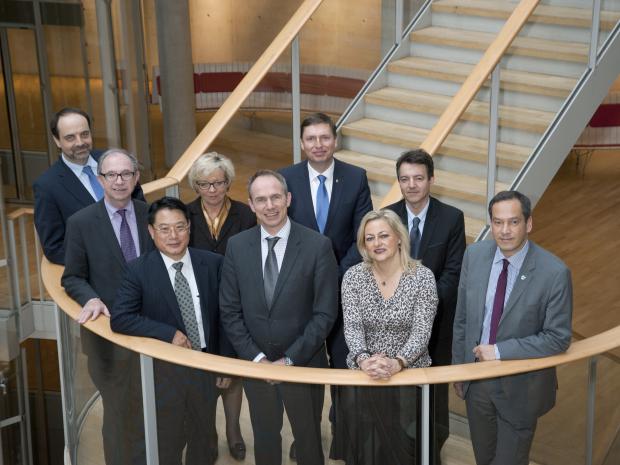UNIDO and EIB explore closer cooperation, possible MoU
Discussion details

UNIDO (United Nations Industrial Development Organization) Director General M. Li Yong visited EIB on 3rd March 2015. Exchanges on UNIDO and EIB policies and instruments led to the identification of various areas for close cooperation and partnership in the field of Private Sector development and support to SMEs, particularly in ACP/SSA countries. These areas range from knowledge dissemination and the identification of investment opportunities to leveraging UNIDO grants with EIB loans, increasing investment return through technical assistance to SMEs and enhancing the coordination of multi-stakeholder operations (PPPs).
UNIDO and EIB mandates, policies and instruments are complementary. Both institutions focus on private sector development, with a large scope of sectors covered, and are operating in common regions/countries in the frame of multi-stakeholders’ projects. Both institutions share a common vision on global challenges (SDGs, Climate change, public goods, social and environmental issues).
UNIDO is the central coordinator within the UN System for international cooperation towards Inclusive and Sustainable Industrial Development (ISID). To support the UN Secretary General reports on the post-2015 development agenda, UNIDO co-lead the UN Global Consultation on “Engaging the Private Sector in the Post-2015 Development Agenda” together with the UN Global Compact. In the Post-2015 Development Agenda, UNIDO’s role will particularly be crucial to support implementation and reporting on SDG 9: Build resilient infrastructure, promote inclusive and sustainable industrialization and foster innovation. In this regard, UNIDO is in charge of coordinating Chapter 5 of the Global Sustainable Development Report (GSDR) 2015, dedicated to economic growth, inclusive and sustainable industrial development and sustainable consumption and production. UNIDO operates worldwide focusing on inclusive and sustainable industrial development (ISID) through a broad range of activities (technical cooperation, action-oriented research and policy advisory services, standards and compliance, and SMEs upgrading programs).
EIB, the “EU Bank”, operates both in and outside the EU, through a broad range of mandates and instruments. Activities in ACPs and in particular Sub-Saharan Africa (SSA) are financed (up to a max 50% of total costs of projects) by:
- the ACP Investment Facility (Cotonou Mandate) with a focus on private sector and financial sector development (approx. 85% of an average amount committed of EUR 750m between 2015 and 2017)
- the Bank’s own resources (OR), mainly for public sector infrastructure projects
Products include loans to corporates, intermediary lending to SMEs and mid-caps, guarantees, equity & quasi equity, microfinance. Through the Impact Financing Envelop (IFE, EUR 500m endowment), the EIB will develop further its sectors/countries of operations (higher risk-bearing projects in agriculture and agribusiness, health, education…). The EIB also provides technical assistance and works in close relationship with other DFIs. EIB operations are aligned with EU policies and EIB plays a major role in EU Blending facilities’ implementation.
Log in with your EU Login account to post or comment on the platform.